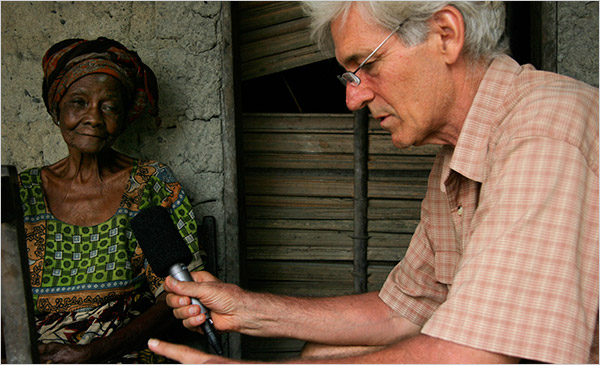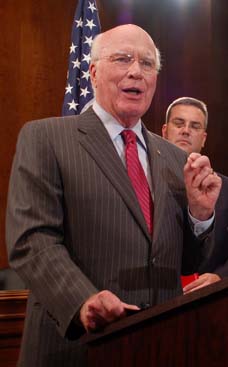
It used to be that field linguists like Dr. Childs, a scattered corps working against time to salvage the world's endangered tongues - more than 3,000 at last count - scribbled data in smeared notebooks and stored sounds on cassette tapes, destined to rot in boxes. But linguistics has gone digital. Dr. Childs now uses a solid-state recorder, and he has applications that will analyze the elements of a vowel in seconds or compare sounds across languages. Using Geographic Information Systems, software that translates data into maps, he and his research assistants, Hannah Sarvasy and Ali Turay, pinpoint villages that are not to be found on any official map. "There's a whole bunch of reasons linguists want these languages preserved," Dr. Childs said, "but for me it's more an emotional thing. It's not noblesse oblige, it's capitalist oblige. These people are totally peripheralized." In its new digital form, this kind of research is more accessible. It allows larger projects to share the world's linguistic heritage with a wider public of teachers and learners, including, when possible, the original speakers. The aim is not just to salvage, but to revive. Financed by the Hans Rausing Endangered Languages Project and the National Science Foundation, Dr. Childs's recordings will find their way, once his study ends and he returns to his post as a professor at Portland State University in Oregon, to a huge data bank in the School of Oriental and African Studies at the University of London.
Liberia RPCV Tucker Childs works to preserve West African Languages
Linguist's Preservation Kit Has New Digital Tools
By CHRIS NICHOLSON
Published: July 27, 2009
Caption: SAVING A LANGUAGE Tucker Childs recording a woman named Yema, who is one of about two dozen remaining speakers of the Kim language. Photo: Chris Nicholson
TEI, Sierra Leone - Jogue, yipe, simoi are three short words for foods in Kim, a language in Sierra Leone that Tucker Childs has been trying, for the past three years, to write down, record and understand.
Kim is a dying language, and Dr. Childs a field linguist. From his base here in Tei, a small fishing village on the Waanje River, he canoes up the narrow waterways that cut across the river's floodplain, and hikes a few miles inland, to where the last Kim communities remain. Based on recordings taken there, he has devised an alphabet and compiled a dictionary and is finishing a book on the grammar.
Africa has about 2,000 of the world's 6,000 languages. Many are still unwritten, some have yet to be named and many will probably disappear. For centuries, social and economic incentives have been working against Kim and in favor of Mende, a language used widely in the region, until finally, Dr. Childs speculates, the Kim language has been pushed to the verge of extinction.
It used to be that field linguists like Dr. Childs, a scattered corps working against time to salvage the world's endangered tongues - more than 3,000 at last count - scribbled data in smeared notebooks and stored sounds on cassette tapes, destined to rot in boxes. But linguistics has gone digital. Dr. Childs now uses a solid-state recorder, and he has applications that will analyze the elements of a vowel in seconds or compare sounds across languages.
Using Geographic Information Systems, software that translates data into maps, he and his research assistants, Hannah Sarvasy and Ali Turay, pinpoint villages that are not to be found on any official map. "There's a whole bunch of reasons linguists want these languages preserved," Dr. Childs said, "but for me it's more an emotional thing. It's not noblesse oblige, it's capitalist oblige. These people are totally peripheralized."
In its new digital form, this kind of research is more accessible. It allows larger projects to share the world's linguistic heritage with a wider public of teachers and learners, including, when possible, the original speakers.
The aim is not just to salvage, but to revive. Financed by the Hans Rausing Endangered Languages Project and the National Science Foundation, Dr. Childs's recordings will find their way, once his study ends and he returns to his post as a professor at Portland State University in Oregon, to a huge data bank in the School of Oriental and African Studies at the University of London.
The director of the endangered languages archive at S.O.A.S., David Nathan, said the school's Web site, elar.soas.ac.uk, is set to start sharing data at summer's end. "What we're trading in with language documentation is a new genre of stuff which doesn't have any publication channel," he said.
Until now, anyway. The new genre is really a grab bag that includes audio recordings of conversations and folktales, videos of songs and dances, and text transcriptions. But as with most new genres, this one is coming into the world with birthing pains.
Just getting decent recordings can be difficult. The villages of Nyandehun and Mosenten, for example, are roadless, low-tech places. With more elaborate equipment, batteries fail unexpectedly, miles from an electrical outlet. Humidity and dust creep into machines.
Also, some linguists have had trouble mastering the new machines. "For most linguists, audio is just an inconvenience on the way to transcription," Mr. Nathan said. In the past, he added, "the quality would be so bad, it was really just evidence that they had gone there, a talisman that they had gone to the field."
The relationship between linguistics and technology goes deeper than what format the sounds are recorded in. Dr. Childs, who remembers working with computers as large as a room when he was a doctoral student, said that theories of language often shaped themselves to resemble the tools at hand.
In the beginning, he said, linguists imagined that the mind processed language with many rules and little in storage. "What happened over time was that more and more stuff was moved into the lexicon, was listed there, and that sort of paralleled developments in the computer industry of storage getting cheaper," he said.
S.O.A.S. is not alone in trying to document endangered languages. The Max Planck Institute in Nijmegen, the Netherlands, has been operating an archive for 10 years. Dagmar Jung, a linguist in Cologne, Germany, is working with the elders of the Beaver, or Dane-Zaa, tribe in the Canadian provinces of British Columbia and Alberta to gather material and make it accessible through a community portal. "It's there for later generations," Dr. Jung said. "But it's not user-friendly for the moment."
Beaver speakers do have access to some recordings of their songs and stories online. Gary Oker, 49, a former chief of the Dane-Zaa, said putting recordings of elders online was part of a project to take traditional world views and make them part of the present. Dane-Zaa youth were involved throughout the process, from producing the recordings of elders that went online, to using them later as references in school.
Although he saw his language slipping away, he said that as the young people had "taken an oral tradition and documented it in many forms," the contact had made them "prouder of their history and who they are." The stories, he said, helped them learn their identity and how they related to the land.
Because of oil and gas development, Mr. Oker said, "our environment is changing so quickly, we need to capture as much as we can." Even if the language is lost, he said, "the wisdom can be transmitted."
Of course, online resources are useful only to communities with Internet access. Communities without that access, like the Kim, still require books to be printed, and recordings to be copied onto CDs or tapes.
Holding more promise are programs that put electronic dictionaries on mobile phones. James McElvenny, a linguist at the University of Sydney, has led the development of software to help revitalize vanishing languages. Mr. McElvenny has been working with Aboriginal groups like the Dharug of Sydney to give learners, many of them no older than 16, a portable reference that supplies the definition and the sound of words that are otherwise no longer spoken, because Dharug is a dead language.
"A lot of the older members are technophobic," he said, "but the kids are really getting into it."
As for Kim, these efforts may be too late. A language, like a person, usually ages before it dies. Four people have died since Mr. Childs's project began, and the 20 fluent Kim speakers are all over 60.
"People today can't speak Kim because their parents didn't speak it to them," said Fasia Kohlia, one of Kim's best speakers. "Parents used to call their children to breast-feed in Kim - ‘kun moga, kun moga, kun moga,' " she said. But when she had children, she called to them in Mende.













